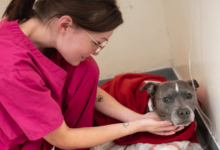PDSA warns of the fatal dangers of common household medicines

Everyday drugs used in millions of homes across the UK could be a death sentence to pets if swallowed, PDSA warned today.
The vet charity issued the warning after continuing to see poisoning cases involving pets that have ingested common household drugs such as ibuprofen and paracetamol.
It comes as figures from the Veterinary Poisons Information Service (VPIS) show that ‘non-steroidal anti-inflammatory drugs (NSAIDs)’ – those common in over-the-counter painkillers and cold and flu products – are among the top five enquiries they receive.
VPIS also reported that these drugs accounted for several pet deaths last year – with three fatal cases involving dogs, two of which were related to naproxen and one involving exposure to ibuprofen. One cat also had to be euthanised after eating paracetamol. But PDSA believes that many cases are going unreported.
PDSA vet Olivia Anderson-Nathan said it was vital for pet owners to realise the dangers common household drugs can pose to their animals.
She said: “Drugs like ibuprofen and paracetamol are a staple of the household medicine cabinet, but you should store them in the same way you would if you had young children in the family, as they can be just as dangerous to our pets.”
“With funding assistance from players of People’s Postcode Lottery we’re warning pet owners about the dangers and what they can do to keep their pets safe.”
It can be surprisingly easy for a pet to get their paws on these drugs and if they do the consequences can be devastating. There are also instances where pet owners attempt to medicate their pets using human drugs, but this is extremely dangerous – paracetamol, for example, is particularly toxic to cats – and any medications used on pets should always be prescribed by a vet.
According to the latest data from VPIS – a 24 hour telephone emergency service used by vets for animal poisoning cases – enquiries about NSAIDs were the most common across all pet species, with 861 total enquiries over 12 months. Paracetamol was the fourth most common, accounting for 401 enquiries.
Olivia added: “These drugs are among the most common in the UK and can be bought over-the-counter for pain management and in cold and flu products.”
“People often carry blister packs in pockets or bags, which can be very tempting for a pet to explore or it’s not uncommon to hear of people giving their pet some paracetamol or other common human painkillers when their pet seems unwell. It’s really important to remember to store medicines away in a locked cabinet or box and never to attempt medication using drugs intended for people, unless advised by your vet.”
Olivia said it was vital for owners to seek emergency veterinary treatment straight away if they suspect their pet has come into contact with anything toxic.
She said: “It’s important to contact your vet for advice urgently. In an emergency situation it’s useful to let the vet know as much as possible about the offending substance, so they can give the appropriate treatment. So always keep the packaging and take it with you if you need to go to the surgery.”
Case studies
Duke
Jack Russell crossbreed puppy Duke was saved by PDSA vets after he got his paws on a cold and flu sachet containing paracetamol.
Nathan Chapman (27) and his partner Nikki Mortimore (43) from Hartcliffe, Bristol, awoke in the morning to find a chewed up packet of the human medication in their 12-week-old pup’s bed.
“I went to let him outside and noticed the packet amongst his bedding, I immediately panicked and realised something wasn’t right,” said Nathan.
“Nikki suggested calling PDSA and the vets told us to bring him straight in. Duke seemed ok but it was difficult to tell how much he had eaten so we were really worried.”
Vets at Bristol PDSA Pet Hospital assessed Duke and immediately began treatment. However, an antidote used to counteract the effect of paracetamol was not in stock at the hospital, so a desperate rush to locate some ensued.
Penny Morgan, PDSA vet, said: “The sachet contained 1,000mg of paracetamol which for a large adult dog may not cause too many problems, but for a young puppy like Duke could be fatal.
“We treated him for a ‘worst case scenario’ but didn’t have any N-acetylcysteine – a drug which acts as an antidote to paracetamol-induced toxicity. We contacted local vet practices and one of our vet nurses travelled across the city in order to get hold of the drug we needed to save Duke.”
Duke was given the medication and was monitored closely before being deemed well enough to return home.
Nathan said the couple were extremely grateful to PDSA for saving Duke.
He said: “I’m so happy that he made such a good recovery without any lasting effects. He’s such a lively puppy and it’s definitely made us more vigilant when it comes to storing medicines in a place where he can’t get his paws on them!
“PDSA were fantastic and they really went out of their way to help Duke.”
Milly
German Shepherd, Milly, was rushed to Oldbury PDSA Pet Hospital in the West Midlands after she ate some ibuprofen tablets that had fallen out of her owner’s pocket.
Thanks to her owners’ quick-thinking actions she was admitted to the hospital within an hour of ingesting the tablets, which meant emergency treatment could begin before her body had begun digesting them.
Owner Sharon, said her husband Mark had been suffering with a headache and had placed a pack of tablets in his pocket.
She said: “He had been sitting in the garden to get some fresh air and they must have fallen out.
“When he came back inside and checked his pocket we quickly realised what had happened.”
Sharon said they rushed out to the garden and found the now empty packet, along with some loose tablets, on the ground. It was unclear how many tablets Milly had eaten but they knew she required urgent veterinary treatment.
PDSA vets gave Milly medication to induce vomiting and to absorb any remaining toxins. Milly was kept in overnight on a drip before being allowed home the following day.
Senior vet Ian Fleming, from Oldbury PDSA, said: “Milly is definitely one of the lucky ones as it could have been so much worse.”
“Thankfully she was brought in very quickly after exposure which meant the ibuprofen hadn’t had chance to take effect. However, we have seen a number of cases over the years where pets haven’t been so fortunate. If Milly hadn’t received such prompt medical treatment she could have been left with severe kidney damage or even kidney failure.”
“These drugs are so common and it’s so easy to forget you have them on your person, so it’s really important to raise awareness of how dangerous they can be.”
Sharon said the family were always careful to store drugs safely but they were now even more aware of the dangers.
Household pain killers such as ibuprofen and paracetamol can cause severe organ damage in pets, symptoms of exposure include:
- Vomiting
- Diarrhoea
- Reduced appetite
- Lethargy
- Abdominal pain
- Black faeces
- Breathing faster or slower than usual
- Blue, brown or yellow tinged gums
- Weakness/wobbliness
- Swelling around the face or paws
- Excessive dribbling
- Drinking and urinating more than usual
- Seizures
For more information visit www.pdsa.org.uk/poisons.













